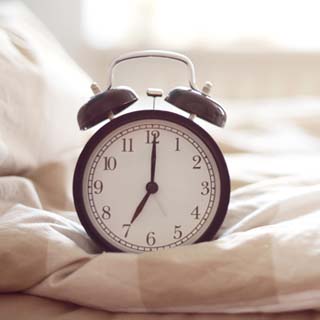In the previous articles in the sleep series, we covered the harmful impact of sleep deprivation, tips for a more successful snooze, and the importance of daytime decisions to improve your quality of sleep. To conclude our blog series, let’s jump into strategies for creating an optimal nighttime routine, or a series of automatic steps to take, to help you fall asleep more easily.
Here are some suggestions to include in your nighttime routine that could help you relax and prime you for sleep. Whatever you decide that comprises your routine, it can be helpful to set an alarm to kick it off about 45 minutes before bed.
1. Start strong. You can begin the routine by listening to music ora podcast while doing your bathroom business. Beginning with an enjoyable activity will allow you to look forward to the process instead of instinctually trying to delay it. Maybe you have a dedicated audiobook that you get to enjoy each night and look forward to picking up the story where you left off.
2. Stretch. Doing a series of relaxing, low-impact exercises like yoga or gentle stretching in the evening can help promote sleep. The key is to draw your awareness to your muscles and feel them getting tired.
3. Breath. These exercises are another way to relax your body. When we are relaxed, our breathing slows. Researchers have found that the relationship is bidirectional, when we deliberately slow our breath, our body relaxes and can more easily fall asleep in a calmer state.
4. Read in bed. Some studies show that reading for as little as six minutes lowers our heart rate, eases muscle tension, and reduces stress by as much as 60%. The more relaxed our mind and body are, the more we can ease into restorative sleep.
5. Journal. Take time to write a few sentences about the events that you experienced that day. When you dedicate moments to actively reflect on your day and put your experience into words, it gives you a sense of control and makes it easier to quiet your thoughts. Not keeping a journal is like spending the whole day painting a portrait and not bothering to step back and examine what you have made and where you want to go for next time. If you are not reflecting on your day, you are not learning or improving how you live.
6. Foster Positive Thoughts. While lying in bed and ready to fall asleep, focus on the positive. Research from the University of California took a cohort of people who were having a hard time falling asleep and divided them into three groups and timed how long it took to fall asleep. Group 1 was not given any instructions and took about an hour. Group 2 was told to try and forget their worries; they fell asleep in about 40 minutes. Group 3 was asked to think pleasant thoughts, they fell asleep in 20 minutes. Focused thinking on something positive like an upcoming vacation, a good movie, an adventure with a friend can help with lights out. The more specific your thoughts, the better, e.g., thinking about the colors you see and the surrounding objects will engross you in the experience and relax you.
Setting yourself up for excellent sleep does not just happen when your head hits the pillow, but in the series of choices you make leading up to bedtime. When you can start and end your routine on a positive note by doing one of your favorite activities and writing in your gratitude journal, you are priming your mind for a quality snooze.
Quote of the day: “If you can’t sleep, then get up and do something instead of lying there and worrying. It’s the worry that gets you, not the loss of sleep.” ― Dale Carnegie
Q: What’s your favorite nighttime routine to prime you for the best sleep of your life? Comment and share with us, we would love to hear!
—
As a Leadership Development & Executive Coach, I partner with people to grow their leadership ability so they can live their best life and develop others more effectively. Contact me to learn more.


